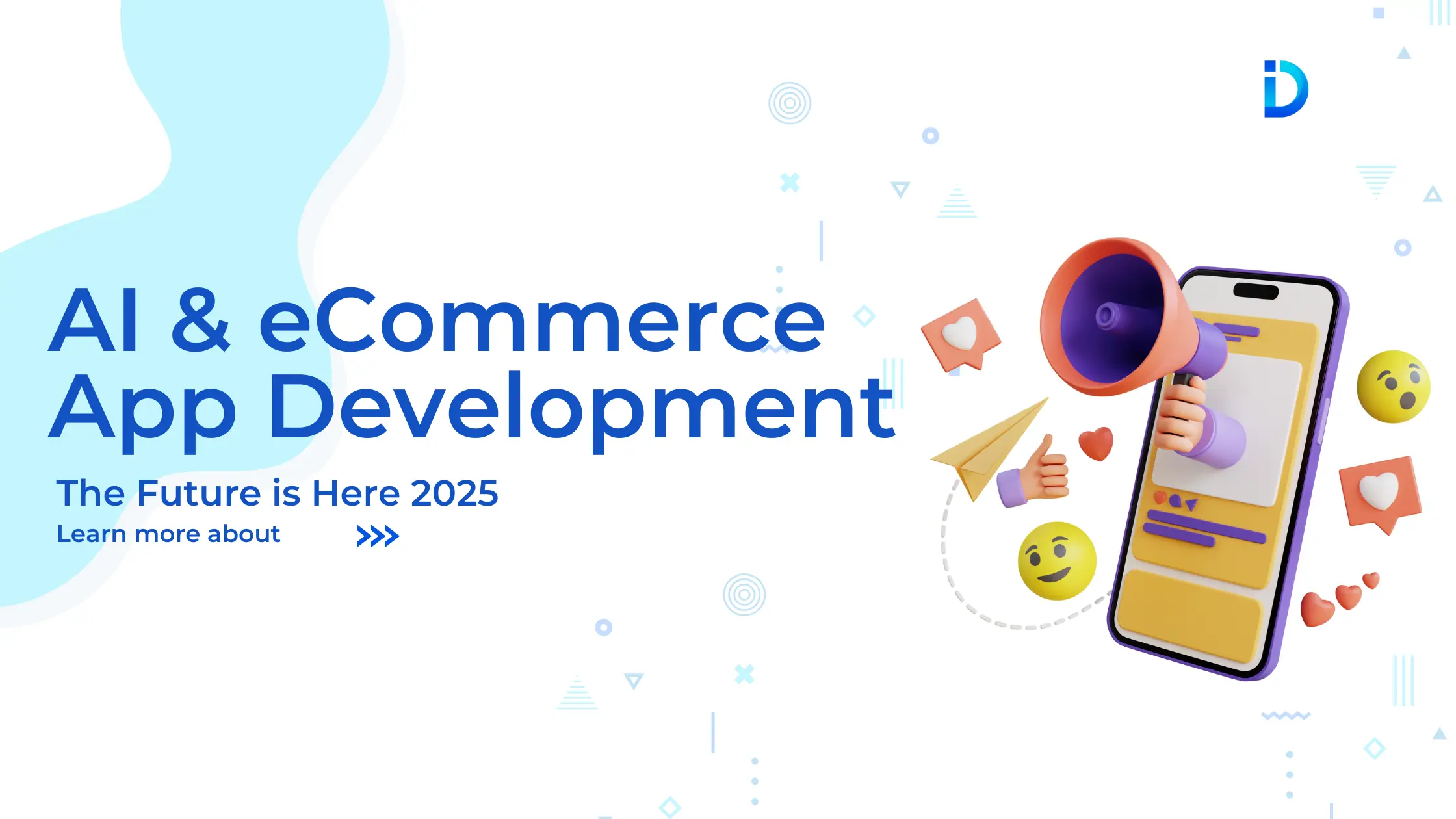
Electronic commerce has fundamentally changed how we shop by shifting us away from static web catalogs to dynamic and personalized mobile online storefronts that are mobile. Through the years, ecommerce app development has grown rapidly due to faster web, more advanced mobile technologies, and consumers’ desire to get instant satisfaction.
The current technological revolution is driven by something far more fundamental, namely Artificial Intelligence (AI). AI is no longer just an idea that is a futuristic one; it’s an engine that’s transforming the shopping experience online to be a straightforward transaction, an intimate, personal trip.
In this post, we’ll look at how AI can transform the ways that businesses create custom, scale-up, and personalize eCommerce app development. This makes the apps smarter, more efficient, and extremely user-friendly.
The Growing Role of AI in Modern eCommerce App Development
In the highly competitive digital world of 2025, AI is no longer the only option for companies in the e-commerce industry. It is now a crucial requirement. The giants of digital that make up the modern retail industry have already embraced AI, establishing a new standard for what customers can expect from them.
The major advantages of AI for online retail are based on three principles: automation, personalization, and the use of data to make decisions. AI helps automate complicated tasks, such as the management of inventory and customer service, which frees up humans to do more innovative work, as well as utilizing massive databases to provide insights that no human workforce could achieve.
The market for AI-enabled eCommerce is worth billions, and more than eighty percent of retailers and CPG companies employ or use AI tools. In addition, research has shown that AI chat has the potential to boost conversion rates by a significant amount and show its real effect on the bottom line. The level of acceptance underscores AI’s significance as the main differentiation factor for every modern online store.
AI-Powered Personalization in eCommerce Apps
The key to an enjoyable shopping experience lies in that feeling of having been understood. This is the area where AI is at its best, providing a truly AI powered shopping app.
AI makes use of advanced analysis to aid apps in understanding how users behave, and goes beyond basic demographics. When it analyzes browsing history as well as purchasing patterns, scroll depth, and even the length of duration of a particular picture, AI develops a complete live user profile.
- Recommendations for Products: Machine learning algorithms provide extremely accurate recommendations for products and suggest that “customers who purchased this product purchased this item also purchased it” …” or were “inspired by browsing histories.” Digital giants such as Amazon, Flipkart, and Myntra employ sophisticated recommendation engines — often the result of a combination of collaborative as well as content-based filtering to generate a large amount of their profits by selling suggestions.
- Dynamic Layouts AI will dynamically modify page layouts and the sorting of products in real-time, making sure that the first-time visitor is shown the most popular items, while a returning, highly valued client will see personalized deals.
AI Chatbots & Virtual Shopping Assistants
The days of sitting for customer support to call have gone. AI chatbots for eCommerce transform customer service and customer support.
Virtual shopping assistants make use of advanced Natural Language Processing (NLP) to not only comprehend what users are seeking but also what is the motivation behind the question. They can provide 24/7 help for everything from tracking your orders to providing answers to FAQs, as well as guiding the buyer through a chat-based checkout procedure.
With their quick answers and personalised assistance, AI chatbots improve retention rates and drastically decrease abandonment from carts, typically because of unanswered inquiries or a lack of support at the point of purchasing.
AI in Visual Search & Product Discovery
Sometimes, customers know the things they’d like but are unable to locate the right words to find the item. Visual search, powered by technology that recognizes images, solves the problem.
Through the integration of computer vision, an AI-powered shopping app lets users upload images (e.g., the dress you saw in magazines) and immediately search the store for similar or comparable merchandise. Apps such as Google Lens have normalized this behaviour, and the majority of eCommerce app development projects are now incorporating AI-powered camera searches to speed up discovery, as well as a superior UX Experience (UX) as well and higher conversion rates.
AI-Driven Pricing & Inventory Management
As customers reap the benefits that come from front-end AI, Online retailers can benefit massively by using back-end tools, particularly in Machine Learning in ecommerce.
- Dynamic Pricing Artificial Intelligence uses machine learning algorithms that continuously monitor the prices of competitors, demands, and levels of inventory, changing prices instantly so that you can maximize profits without being able to compete.
- Predictive Inventory AI anticipates the demand for goods with high precision and takes into consideration the seasonal patterns, impact of promotions, and data from the past. This ability optimizes inventory levels and prevents expensive stock-outs, as well as reduces the amount of inventory. This reduces the amount of waste produced and reduces costs for holding. A major distributor, after using AI to control inventory levels, has reported a decrease of 20 % to 30% in the inventory levels, as well as a decrease in the range of five to 20 percent in the cost of logistics.
Voice Commerce & Smart Assistants
The advent of smart speakers, as well as the mobile-based assistants such as Alexa, Siri, and Google Assistant, is pushing shopping into conversations, leading to voice commerce. AI plays a crucial role in processing complicated natural language commands such as, “Alexa, reorder my favourite coffee I had last month.” The integration of voice-enabled functions in e-commerce app development makes it easier to search for products as well as checkout, clearing the way to the future of shopping without hands.
AI in Fraud Detection & Cybersecurity
The security of the world of online shopping. AI plays a vital active role in security and fraud detection.
With the use of predictive analytics, AI software can immediately examine millions of transactions in order to find out suspicious patterns, fake accounts, as well as suspicious behavior in payment that could thwart conventional rules-based methods. Artificial Intelligence-based authentication techniques, ranging such as facial recognition and sophisticated OTP Risk analysis, are steadily becoming secure, establishing confidence and safeguarding both customers and businesses.
Predictive Analytics for Customer Insights
The power of AI for online retail is its capacity to anticipate the future. Through the analysis of deep data on behavior, AI algorithms can accurately forecast future purchasing patterns, such as risk of churnCustome and the customer lifetime value (CLV).
The brands that use this data to create highly targeted re-targeting ads, as well as pre-emptive planning for inventory of products that are in high demand, and for increasing the efficiency of marketing spending. These models can ensure that marketing funds are directed to the clients that are most likely to convert, significantly increasing the efficiency of sales.
The Future of AI in eCommerce App Development
The transformation currently underway is only the start. The emerging trends will continue to define ecommerce app development:
- Generative Artificial Intelligence: The technology has moved past chatbots in order to produce customized, high-quality content that is on demand, including descriptions of products, ads, and distinctive image variations that are tailored to the individual needs of each customer.
- AR/VR-Powered shopping: Augmented Reality (AR) trial-ons (e.g., Virtually wearing glasses, or imagining furniture pieces in your living room) as well as Virtual Reality (VR) experiences are being integrated into mobile apps, providing an immersive shopping experience.
- Emotion Artificial Intelligence: The next frontier is the ability of systems to discern the mood of a customer via text or voice and allow the application to modify its behavior and style of service to provide an empathetic, more human interaction.
- Web3, as well as Metaverse Commerce AI, will serve as the core layer of this technology, enabling personal, interactive, seamless shopping experiences across decentralized environments and virtual worlds.
The companies that invest in ecommerce app development using AI today will be the ones who stay ahead of the curve in the race to catch the new wave of e-commerce innovation.
Conclusion
Artificial Intelligence is the single major technology that is driving the rapid development of ecommerce app development services. It’s the one responsible for creating an entirely new model for online retail that is customized, extremely effective, and extremely safe.
Through leveraging AI to manage all kinds of things, from dynamic pricing to managing inventory to intelligent personalization, as well as 24/7 support for customers, Businesses can develop an intelligent, mobile-friendly shopfront. The decision to invest in AI-powered eCommerce is not just a cost; it’s an essential plan for growth over the long term as well as market leadership within the modern economy.
Frequently Asked Questions (FAQs)
Q1: What is the most significant advantage of using AI in eCommerce applications?
Ans: The most significant advantage is Hyper-Personalization. AI analyzes customer data (browsing, purchase history, real-time context) to create a unique, one-to-one shopping journey, leading to highly relevant product recommendations, personalized discounts, and dynamic homepages. This dramatically boosts conversion rates and customer lifetime value (CLV).
Q2: Is AI in eCommerce only suitable for large enterprises?
Ans: No. While large enterprises like Amazon leverage massive, custom AI systems, many AI solutions are now accessible to small and mid-sized businesses. Solutions like AI chatbots for ecommerce, affordable SaaS tools for dynamic pricing, and plug-ins for fraud detection can be easily integrated into standard eCommerce platforms, offering significant ROI at a lower initial cost.
Q3: What are the main challenges when implementing AI into an existing e-commerce app?
Ans: The primary challenges are Data Quality and Integration. AI models are only as good as the data they are trained on. Businesses often struggle with consolidating data from siloed systems (CRM, ERP, web analytics) and ensuring that data is clean, labeled, and voluminous enough to train an accurate and unbiased AI model.
Q4: Beyond product recommendations, what are two key operational uses of AI in eCommerce?
Ans: Two key operational uses are Predictive Inventory Management and Advanced Fraud Detection. AI uses machine learning to forecast demand, allowing businesses to optimize stock levels, prevent costly stockouts, and minimize warehousing expenses. For fraud, AI analyzes transaction patterns in real-time to spot and block anomalous activities, protecting the business and customers from financial loss.
Q5: How will Generative AI (GenAI) change the future of ecommerce app development?
Ans: Generative AI is set to revolutionize Content Creation and Virtual Assistants. It can instantly create hyper-personalized product descriptions, generate lifestyle images for products based on context, and power next-generation virtual shopping assistants that offer human-like, multi-step assistance, effectively serving as an on-demand personal shopper.


